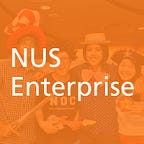Your Burning Questions, Answered
Answers to your burning questions on start-ups and entrepreneurship, contributed by NUS Enterprise start-ups, mentors, and staff. Have a burning question to ask? Send it to us here or hashtag #AskSparks on Facebook/Twitter!
October 2017
Q: “ What motivates governments and corporates to support social enterprises? What are some tangible and intangible outcomes they may expect?”
— NUS FoE Alum (15")
A: Successful social enterprises, those that are financially self-sustaining after an initial injection of resources, are powerful mechanisms of social changes. Unlike not-for-profit organisations, they are subjected to market forces and must create products or services that the consumers are ready to pay for at a fair value — translating into optimisation of resources to reduce cost and wastage. Governments and corporates are becoming increasingly aware about the strength of investing into social enterprises as a form of sustainable community support. Resources are better utilised through a self-sustaining venture that is driven to continuously innovate and adapt to market forces, while providing long-term solutions to address social issues.
— David Pong, CEO, WateROAM
September 2017
Q: “ What is the start-up ecosystem like in China? What are the challenges of starting up in the Chinese market? What are the help and resources available to do so?”
— NUS FoE Alum (07")
A: China has a very well developed and pervasive start-up ecosystem, especially in the mobile and internet domain. Driven by the demands of its huge domestic market, China is now generating and driving some of the world’s top innovative solutions and business models in industries such as fintech, sharing economy and digital learning. Quite a number of start-ups have attained Unicorn status in the last few years. However, start-ups in China face the challenges of unstable government policies. A policy change could severely affect or even threaten the existence of a start-up or services that they provide.
To get started in China, one could tap onto the start-up launch pads provided by NUS Enterprise or IE Singapore. Most importantly, one has to keep the eyes open and feet grounded!
— Associate Professor Steven Zhou, Chairman, MXR Corp
August 2017
Q: “Lean Methodology is currently a popular method being espoused to grow tech start-ups. However, is it also applicable to engineering or deep-tech projects, which usually takes a long time for each iteration of the product development cycle (in comparison to platform or e-commerce businesses)?”
— Lim Cheng Kai, Year 2, NUS Life Science
A: The short answer is, “Yes!”
While the focus during development of new technologies is often on technical challenges such as scalability, cost, safety and manufacture-ability, the Lean Methodology can help us to better understand the possible market(s) — to answer questions like:
- Who are the customers for this product? (Referring to the actual buyers/decision maker(s) and buying process)
- Are there any impediments to choosing our solution?
- What is the current solution? Is there emerging technology that may soon replace it?
- What else must be in place for our technology to work — to make the solution complete?
These questions may determine the feasibility of the product, change the focus of R&D, and affect the iterations needed in the development cycle. Understanding how prospective customers view the problem is also helpful in seeking out initial users and communicating in a meaningful way.
With Lean Methodology, we may discover unexpected things. For example, there may be legal or regulatory barriers that must be overcome for wide adoption. Finally, during the discovery process, we may even uncover better applications for the technology than the ones we focused on initially.
— Kristav (Kris) Childress, Advisor & Mentor-in-Residence at NUS Enterprise
